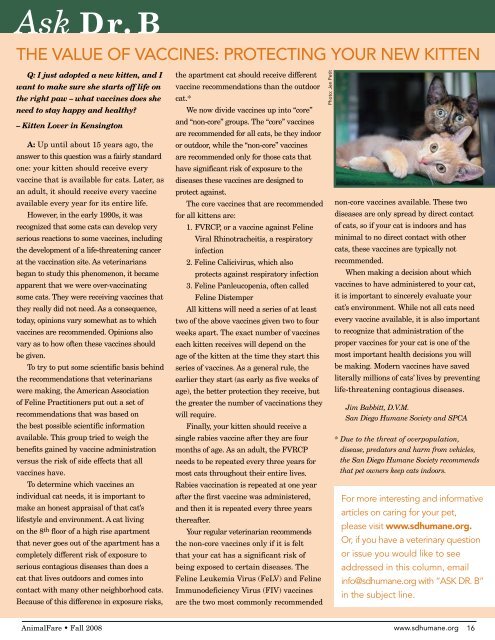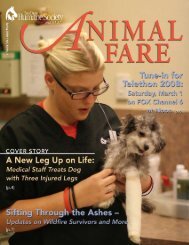Fall 2008 ⢠V ol. 43 No. 3 - San Diego Humane Society and SPCA
Fall 2008 ⢠V ol. 43 No. 3 - San Diego Humane Society and SPCA
Fall 2008 ⢠V ol. 43 No. 3 - San Diego Humane Society and SPCA
You also want an ePaper? Increase the reach of your titles
YUMPU automatically turns print PDFs into web optimized ePapers that Google loves.
Ask Dr. B<br />
The Value of Vaccines: Protecting Your New Kitten<br />
Q: I just adopted a new kitten, <strong>and</strong> I<br />
want to make sure she starts off life on<br />
the right paw – what vaccines does she<br />
need to stay happy <strong>and</strong> healthy?<br />
– Kitten Lover in Kensington<br />
A: Up until about 15 years ago, the<br />
answer to this question was a fairly st<strong>and</strong>ard<br />
one: your kitten should receive every<br />
vaccine that is available for cats. Later, as<br />
an adult, it should receive every vaccine<br />
available every year for its entire life.<br />
However, in the early 1990s, it was<br />
recognized that some cats can develop very<br />
serious reactions to some vaccines, including<br />
the development of a life-threatening cancer<br />
at the vaccination site. As veterinarians<br />
began to study this phenomenon, it became<br />
apparent that we were over-vaccinating<br />
some cats. They were receiving vaccines that<br />
they really did not need. As a consequence,<br />
today, opinions vary somewhat as to which<br />
vaccines are recommended. Opinions also<br />
vary as to how often these vaccines should<br />
be given.<br />
To try to put some scientific basis behind<br />
the recommendations that veterinarians<br />
were making, the American Association<br />
of Feline Practitioners put out a set of<br />
recommendations that was based on<br />
the best possible scientific information<br />
available. This group tried to weigh the<br />
benefits gained by vaccine administration<br />
versus the risk of side effects that all<br />
vaccines have.<br />
To determine which vaccines an<br />
individual cat needs, it is important to<br />
make an honest appraisal of that cat’s<br />
lifestyle <strong>and</strong> environment. A cat living<br />
on the 8 th floor of a high rise apartment<br />
that never goes out of the apartment has a<br />
completely different risk of exposure to<br />
serious contagious diseases than does a<br />
cat that lives outdoors <strong>and</strong> comes into<br />
contact with many other neighborhood cats.<br />
Because of this difference in exposure risks,<br />
the apartment cat should receive different<br />
vaccine recommendations than the outdoor<br />
cat.*<br />
We now divide vaccines up into “core”<br />
<strong>and</strong> “non-core” groups. The “core” vaccines<br />
are recommended for all cats, be they indoor<br />
or outdoor, while the “non-core” vaccines<br />
are recommended only for those cats that<br />
have significant risk of exposure to the<br />
diseases these vaccines are designed to<br />
protect against.<br />
The core vaccines that are recommended<br />
for all kittens are:<br />
1. FVRCP, or a vaccine against Feline<br />
Viral Rhinotracheitis, a respiratory<br />
infection<br />
2. Feline Calicivirus, which also<br />
protects against respiratory infection<br />
3. Feline Panleucopenia, often called<br />
Feline Distemper<br />
All kittens will need a series of at least<br />
two of the above vaccines given two to four<br />
weeks apart. The exact number of vaccines<br />
each kitten receives will depend on the<br />
age of the kitten at the time they start this<br />
series of vaccines. As a general rule, the<br />
earlier they start (as early as five weeks of<br />
age), the better protection they receive, but<br />
the greater the number of vaccinations they<br />
will require.<br />
Finally, your kitten should receive a<br />
single rabies vaccine after they are four<br />
months of age. As an adult, the FVRCP<br />
needs to be repeated every three years for<br />
most cats throughout their entire lives.<br />
Rabies vaccination is repeated at one year<br />
after the first vaccine was administered,<br />
<strong>and</strong> then it is repeated every three years<br />
thereafter.<br />
Your regular veterinarian recommends<br />
the non-core vaccines only if it is felt<br />
that your cat has a significant risk of<br />
being exposed to certain diseases. The<br />
Feline Leukemia Virus (FeLV) <strong>and</strong> Feline<br />
Immunodeficiency Virus (FIV) vaccines<br />
are the two most commonly recommended<br />
Photo: Jen Petit<br />
non-core vaccines available. These two<br />
diseases are only spread by direct contact<br />
of cats, so if your cat is indoors <strong>and</strong> has<br />
minimal to no direct contact with other<br />
cats, these vaccines are typically not<br />
recommended.<br />
When making a decision about which<br />
vaccines to have administered to your cat,<br />
it is important to sincerely evaluate your<br />
cat’s environment. While not all cats need<br />
every vaccine available, it is also important<br />
to recognize that administration of the<br />
proper vaccines for your cat is one of the<br />
most important health decisions you will<br />
be making. Modern vaccines have saved<br />
literally millions of cats’ lives by preventing<br />
life-threatening contagious diseases.<br />
Jim Babbitt, D.V.M.<br />
<strong>San</strong> <strong>Diego</strong> <strong>Humane</strong> <strong>Society</strong> <strong>and</strong> <strong>SPCA</strong><br />
* Due to the threat of overpopulation,<br />
disease, predators <strong>and</strong> harm from vehicles,<br />
the <strong>San</strong> <strong>Diego</strong> <strong>Humane</strong> <strong>Society</strong> recommends<br />
that pet owners keep cats indoors.<br />
For more interesting <strong>and</strong> informative<br />
articles on caring for your pet,<br />
please visit www.sdhumane.org.<br />
Or, if you have a veterinary question<br />
or issue you would like to see<br />
addressed in this c<strong>ol</strong>umn, email<br />
info@sdhumane.org with “ASK DR. B”<br />
in the subject line.<br />
AnimalFare • <strong>Fall</strong> <strong>2008</strong><br />
www.sdhumane.org<br />
16
















